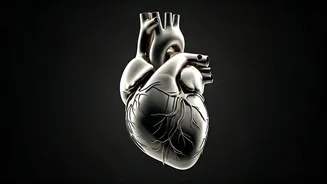Steer Clear of Tobacco
The first critical avoidance mentioned by the heart surgeon is the use of tobacco, which includes both smoking and vaping. These habits introduce harmful
chemicals into the body, directly impacting the cardiovascular system. Smoking damages blood vessels, making them narrower and less flexible, thereby increasing the risk of blockages that can lead to heart attacks and strokes. Similarly, vaping, although often perceived as a safer alternative, still exposes the lungs and cardiovascular system to harmful substances. Avoiding tobacco products altogether is a vital step in maintaining optimal heart health, especially after the age of 30. It's about preserving the body's natural defenses and ensuring the circulatory system remains robust and efficient.
Prioritize Quality Sleep
Neglecting sleep is another significant concern that the heart surgeon highlights for those over 30. Insufficient or poor-quality sleep disrupts the body's natural rhythms, negatively affecting cardiovascular health. Sleep deprivation can lead to increased blood pressure, a major risk factor for heart disease, and it also affects the body's ability to regulate hormones that impact heart function. Chronic sleep issues can elevate stress levels and inflammation, further stressing the heart. Making sleep a priority, aiming for 7-9 hours of restful sleep each night, is crucial. This proactive approach supports overall well-being and reduces the strain on your heart, fostering a healthier future.
Manage Stress Effectively
The third area to avoid involves failing to manage stress effectively. Stress triggers the release of hormones that can temporarily increase blood pressure and heart rate. Chronic stress, however, can lead to prolonged elevations, damaging the heart over time. Finding healthy coping mechanisms for stress is essential. This can include regular exercise, meditation, yoga, or spending time in nature. Engaging in activities that promote relaxation and well-being can help to lower stress levels and protect the heart. Being mindful of your stress triggers and implementing strategies to manage them, is a proactive approach to prevent potential heart health issues.
Stay Away from Relationships
The final point that the heart surgeon emphasizes is avoiding being in toxic or high-stress relationships. Negative relationships can cause emotional distress, contributing to stress and, in turn, affecting heart health. The emotional toll of such relationships can negatively impact both mental and physical health, increasing the risk of cardiovascular problems. Removing yourself from these types of relationships, or finding ways to improve communication and conflict resolution, can reduce the strain on your heart and overall health. Prioritizing healthy relationships and self-care is a beneficial choice for those seeking to protect their cardiovascular well-being.












